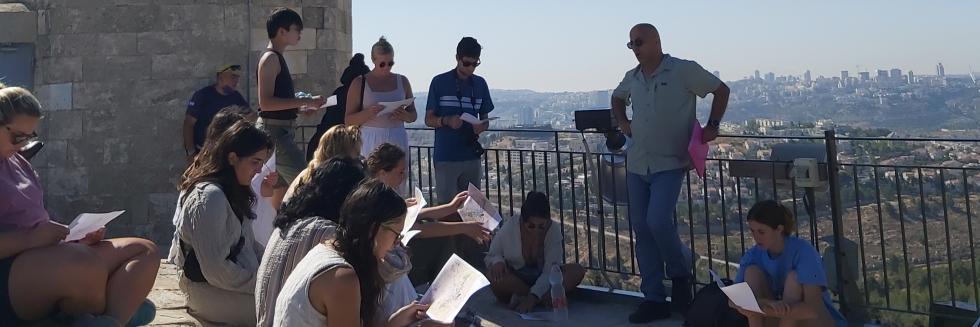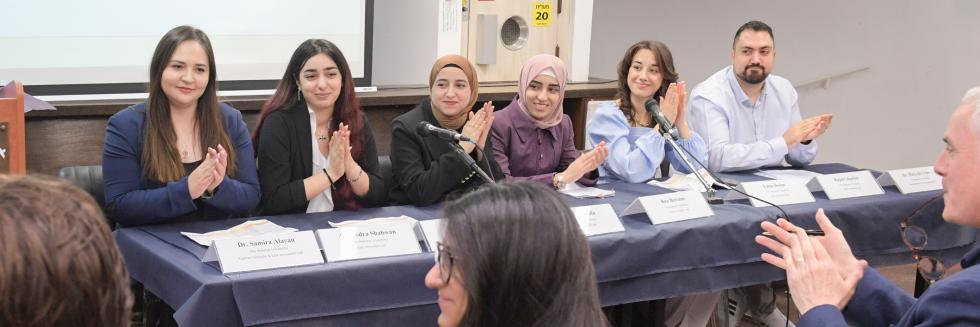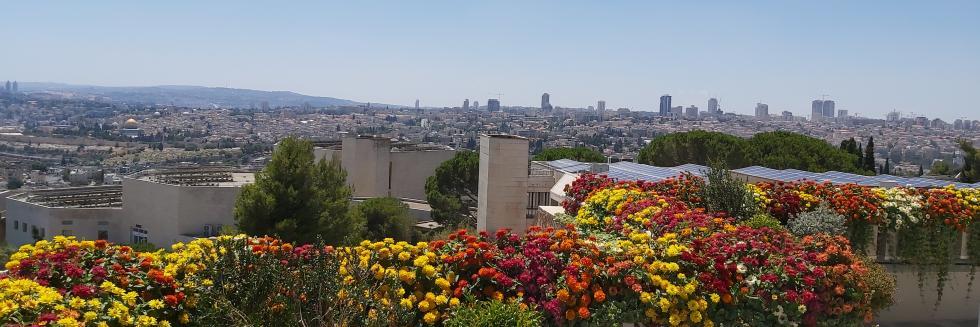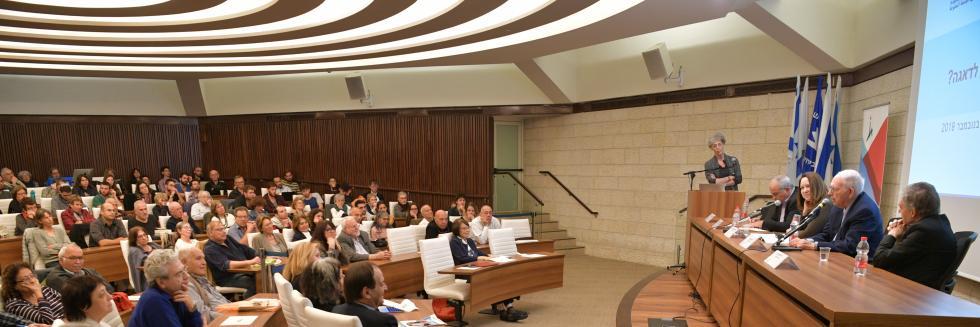Head of the Unit: Dr. Ruth S. Wenske
Africounters
Bringing together Africanists from all over the country, the Africounters workshop series has been hosted by the Truman Institute since the 2016-17 academic year, and has surpassed 110 registered participants. Conducted on a monthly basis, each session focuses on a general theme, selected and developed by the participants themselves. Sessions include presentations of individual and group research, as well as high-level guest speakers including university professors, private- and public-sector professionals, embassy representatives, and political activists. We have also organized a number of international conferences and workshops.
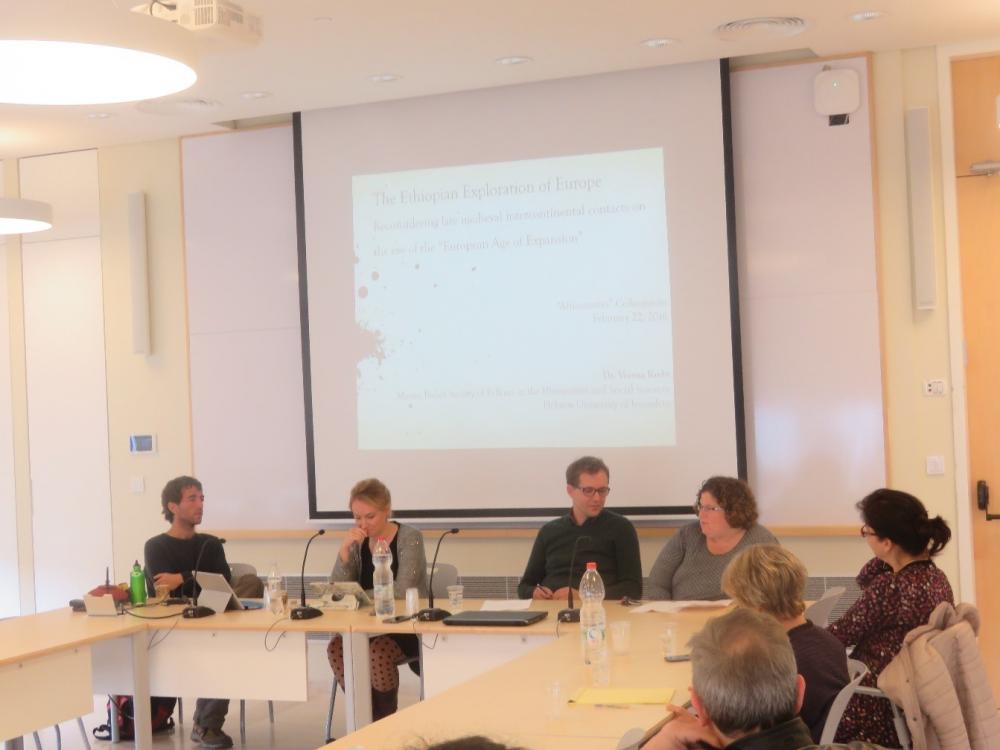
Since its inauguration, several individuals have joined the Africounters core member - Dr. Marlous van Waijenburg from the Michigan Society of Fellows, Manya Kagan from Ben-Gurion University of the Negev, Tamara Karzhner from the University of California, Berkeley, and another Buber fellow as of 2018, Dr. Ruth Wenske - which in itself is telling of the renewed institutional interest in African studies in Israel. Indeed, the positive feedback on this initiative and the high number of participants underline the increased interest in the African continent among Israeli scholars.

CONFERENCEs organized
The following is a list of conference that the Africa Unit, through Africounters, has organized over the past two years together with various programs in Israel and abroad.
The Momentous 60s: Reflections on an African Decade, January 2019
Organized in conjunction with The Tamar Golan Africa Centre at the Ben-Gurion University of the Negev, the University of Leipzig, and the ERC Project “Apartheid Stops”, this conference brought together over 30 scholars, including a significant number of academics from Africa, who presented their research in the context of the revolutionary changes that took place throughout Africa in the 1960s. Scholars from diverse disciplines – history, education, economics, sociology and anthropology, international relations, and literature – came together to reexamine histories of colonialism, decolonization, the Cold War, nationalism, pan-Africanism and independence, and the way these gave birth to new kinds of circulations, imaginaries, and initiatives.

Young Africanists Annual Conference, June 2018
Together with the Africa Center at Ben Gurion University, the Africa Unit co-hosted the second annual young Africanists conference. This two-day conference, titled "Keywords in African Studies", aimed to establish creative lines of dialogue across research projects and across disciplines, and help researchers to find new directions for conceptualizing and framing their work and to facilitate new intellectual exchange and collaborations. The conference's location was divided between the two hosts—first day at the Truman Institute and second day at the Africa Center at Ben Gurion University—and involved eleven panels and about twenty five speakers from Israel and abroad, who discussed such keywords as "violence", "sustainability", "(in)formality", "solidarity", "legacy", "language", and "faith".
Childhood, Youth, and Family Life in the Shadow of Statelessness, June 2018
The one-day conference, organized with the Center for the Study of Multiculturalism and Diversity, brought together over 100 Israeli academics, practitioners, educators, activists, and members of the asylum seekers’ community to discuss a burning issue in recent years - childhood and youth lived in the shadow of being a stateless refugee. The majority of papers in this conference focused on Israel, which – apart from its geographical relevance – is important as it offers a uniquely complex case of the dynamics of transmigration, displacement, and resettlement. With a focus on the large wave of asylum-seekers to Israel that began in 2006, particularly from Eritrea and Sudan, the conference investigated the personal and structural challenges of children and youth who came with, or were born to, refugee families, as well as unaccompanied minors who left one country for another. Brought into context against the intensification of nationalistic ideals in Israel’s core national curriculum over the last decades and its reflection of the grave political and military conflicts, the speakers presented myriad perspectives that facilitated mutual exchanges on what we consider crucial and urgent contemporary matters.
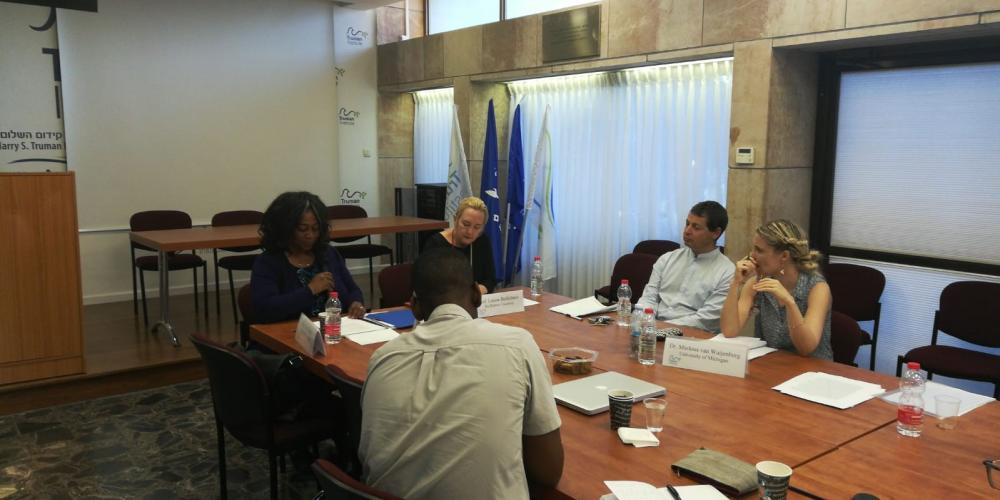
Weapon Trade: The Export of Arms to Conflict Areas, October 2017
Responding to public debate, civil campaigns and discussions in parliament, the Africa Unit organized a one-day conference on the timely topic of arms trade with controversial regimes in Africa and around the world. The event attracted an overall audience of over a hundred people. Approaching the topic from a comprehensive perspective, one panel was dedicated to academic perspectives, another considered civil society, and a third examined media and politics. Among the speakers were high-ranking academics, journalists, activists and politicians, including a current member of parliament.
Democratization, Religion, and the Pursuit of Peace in Africa, May 2017
The conference, was Africa Unit’s main yearly event in 2016-17, brought together senior leaders from both the political and religious spheres from across Africa, as well as academics from Israel and abroad. Through this encounter, the event facilitated a unique trialogue along the nexus connecting politics, religion and academic scholarship. Through these multilateral discussions, the event shed new light on the place of religion in socio-political processes—including democratization and peacebuilding—across the continent, culminating in concrete paths for action and new directions for scholarship. The keynote address was delivered by former Kenyan Prime Minister Raila Odinga, who spoke about democratization and challenges thereto across Africa. This topic was then picked up by successive speakers through the prism of particular contexts, with special emphasis on the responsibility, as well as challenges, for religion in preserving and deepening democratization processes.

Christian Renewal Movements in the Global South in the 20th and 21st Centuries: Religious, Social and Political Transformations, May 2017
The two-day interdisciplinary conference was dedicated to dialogue between scholars of religion in the broad sense of the term, with the aim of developing comparative, interdisciplinary perspectives. The conference was hosted at the Mandel building, Mt. Scopus, and was organized by Truman fellows Yonatan N. Gez and Yael Mabat, together with the help of Tamara Kerzhner, Manya Kagan, Gregor Buss and Marlous van Waijenburg,. The conference enjoyed the sponsorship of the Truman Institute for the Advancement of Peace, the Martin Buber Society of Fellows, the Glocal International Development MA program, and the Hebrew University's Authority for Research and Development. The conference featured over twenty contributors of various career stages and disciplinary orientations from over ten countries, including several from the Global South. The participants explored multiple approaches through which to develop comparative perspectives on these disperse-yet-interrelated religio-social developments, following the explosion of new and diverse forms of Christianity across the Global South. Through multi-sited comparative studies, exploration of moments of cross-regional interaction, and the mapping of channels of inter-regional influences, as well as in-depth and contextualized studies of specific case studies, the conference participants gained insights into how local and global trends play out both geographically and over time.

Workshops and guest lecturers
Workshop and lecture with Prof. Kamari Clarke, May 2018.
Prof. Clarke visited the Africa Unit through a cooperation with the Leonard Davis Institute for International Relations. During a two-day workshop, she reflected on questions of power and representation through her research projects on the International Criminal Court and its jurisdiction. She further engaged with senior Israeli Africanist on a panel that was particularly important to us young scholars, on conceptual, methodological and ethical challenges in transnational research on Africa.
Prof. Clarke is a professor of Global Studies, Law and Legal Studies, and Anthropology, who has worked and published extensively drawing on her broad and interdisciplinary experience. She is the former chair of the Council on African Studies at Yale, and director and co-founder of the Center for Transnational Cultural Analysis at Yale. On a personal note, her family history motivated this, her first, visit to Israel. Though raised in Canada, Prof. Clarke hails from a line of wealthy Jewish traders on her maternal side of the family, who traveled from Ashdod in the late 19th century to the Caribbean to trade diamonds. Her paternal side of the family was formerly enslaved during plantation slavery in Jamaica and eventually bought their freedom and became agricultural landowners. As she writes, this background has made her deeply aware of the complexities of power and the privilege of education and social status.

Visit of Dr. Lazare Rukundwa Sebitereko
In March 2017, the Africa Unit through Africounters supported a two-week visit by Dr. Lazare Rukundwa Sebitereko, the co-founder and rector of the Eben-Ezer University of Minembwe, DRC. Dr. Rukundwa is also a founding member of Burundi American
International Academy, the Paramedical School Kamenge in Burundi, and the Complexe Scolaire d’Application in Minembwe, DRC.
During his visit, our team met with Dr. Sebitereko several times, and starting planning paths for collaboration through a project on building education capacity for peace through traditions and cultural values in the eastern DRC. One of the most inspiring aspects of his work, which left a lasting impression on us, was his project of bringing elders from the local communities to work with students at the university. As many of these elders, especially women, cannot read or write, their knowledge is circulated through oral networks that are largely left outside classrooms. This project allows students to collect and translate oral (his)stories, reworking them into the world of academic knowledge. Beyond immortalizing irreplaceable repositories of knowledge, the project also trailblazes the ways in which universities innovate the fusion of old and new channels of knowledge.
Roundtable events with Sudanese author Adam Ahmed and the Darfuri community in Israel
In the past two years, against the background of intermittent media attention to the fate of African asylum seekers in Israel, we’ve organized two events that focus on the experience of the Darfuri community in Israel, and particularly their artistic and educational endeavors. The first, in January 2018, was a round table with Sudanese-born author Adam Ahmad on "Mobility and Literary Narrative: Between Sudan and Israel", held in conjunction with the ERC “Apartheid – the Global Itinerary.” Most recently, in February 2019, we met again with the author and several other community members to hear about their work over the past year. After an elaborate round table discussion at the Misseriya Jebel Moon Community Center, we enjoyed lunch together at Sudanese restaurant in South Tel Aviv.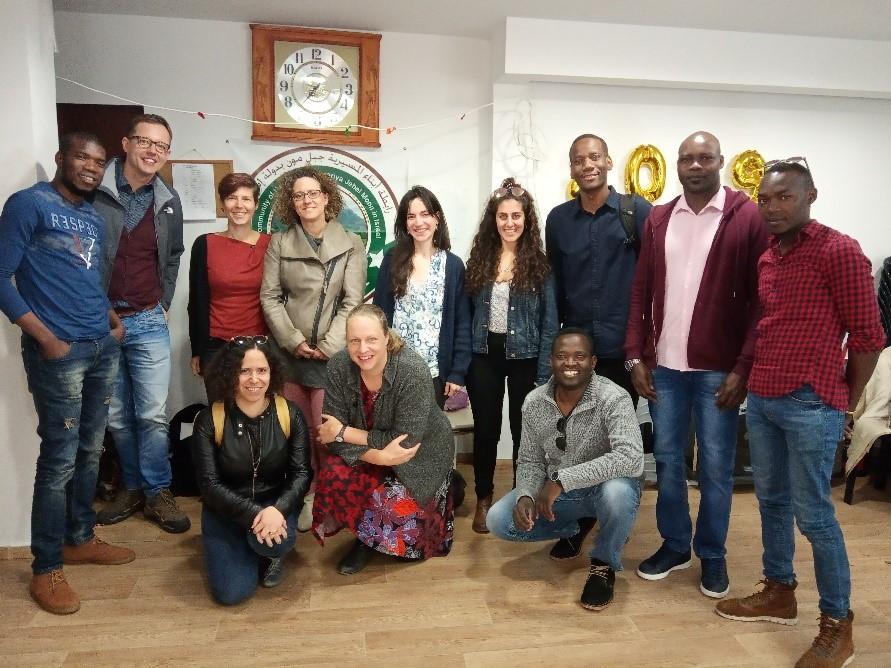
Adam Ahmed has published two books in English: an autobiography titled The Nightmare of the Exile and a collection of short stories called The Voyage of the Destiny. His autobiography has recently been translated to Hebrew under the name From Darfur to Tel Aviv, and his short story “Haj Sabor” has been published in Hebrew by Granta magazine and will soon be published as a novel. Adam has also produced several plays together with director Dr. Yaffa Schuster, most recently Wole Soyinka’s “A Dance of the Forests”, which their Israeli ensemble performed in Lagos in summer 2018 in front of the Nobel laurate himself (see photo). Recently Adam also played in the fictionalized documentary “Hello Tel Aviv?” by Dana Venezia, and is in the process of producing numerous new plays.
Study trip to Uganda
In March 2018, four young scholars who had met through Africounters travelled to Uganda on a research trip aimed at providing us with preliminary information and connections for our respective future researches. Led by Ruth Wenske, who has lived in Uganda for several years, the trip went from Kampala to Soroti, from Makerere University to small village schools and churches, to provide a quick glance at both the urban and rural sides of the country. As it happens, there is a clustering of young Africanists in Israel who focus on Uganda in their research, and as such the trip was important in terms of building our Israeli network of Africanists, who work together both formally and informally to gain a deeper, and more multilayered, understanding of Ugandan society. During the trip, the four of us were able to conduct interviews and make contacts: Gregor Buss met with clergy, teachers, and lay readers, as part of his research on Catholic ethics in Africa; Ruth Wenske and Manya Kagan visited several schools and met with lecturers at Makerere and Kyambogo Universities to learn more about the recent educational reforms and the integration of refugees in primary schools, respectively; and Miriam Frank met with several NGOs to learn more about Uganda’s environmental policies and practices. The added value was, of course, being able to sit down at the end of the day and share our experiences – and further work through our thoughts and findings with colleagues once we got back to Israel.
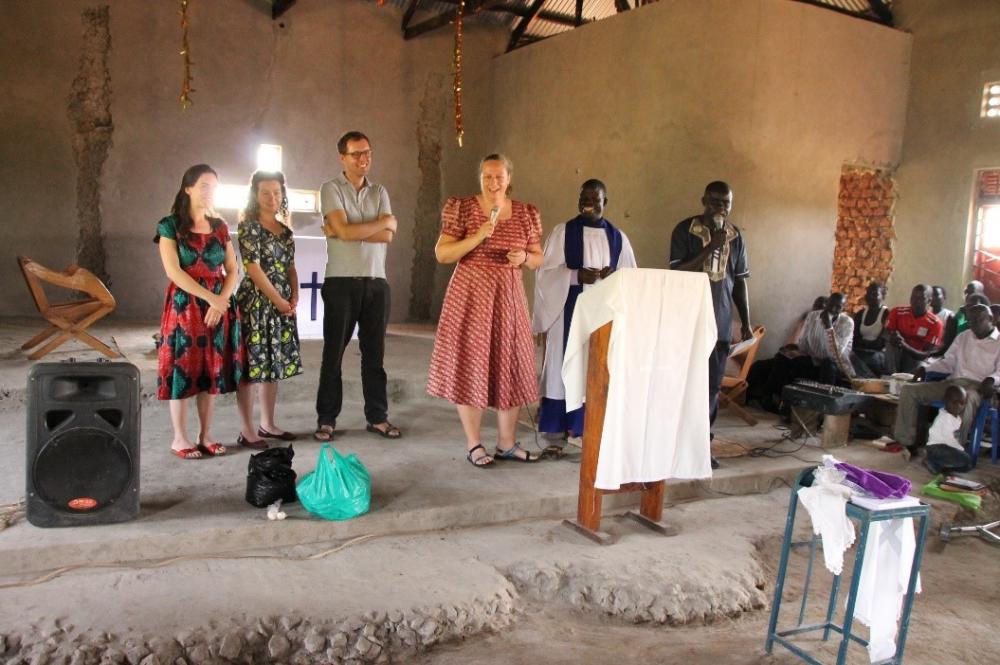



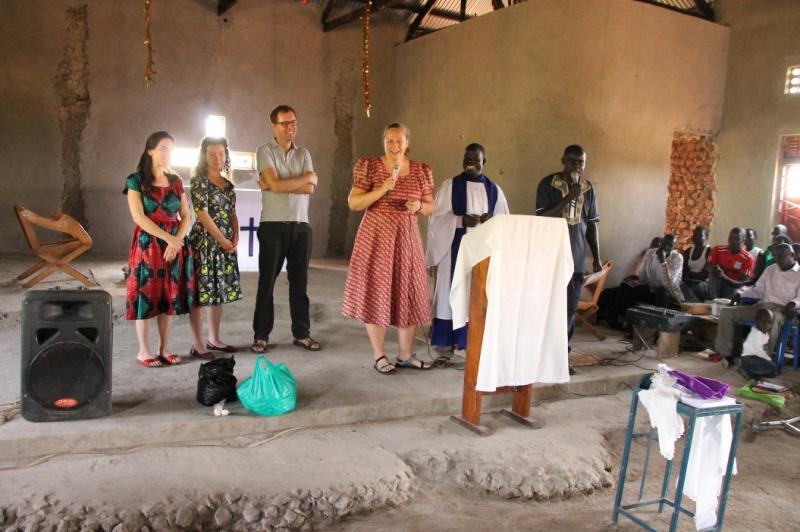
Offshoots
Through Africounters, we have engaged in several other research groups and initiatives:
Critical Development research group (2017/18 and 2018/19)
Critical Development is a shared platform that aims to explore alternative and multicultural views and approaches to development, while seeking to overcome mainstream biases and myopia. This two-year workshop series was inaugurated at the beginning of the 2017/18 academic year, emerging as collaboration between the Truman Institute and the Glocal International Development MA program at the Hebrew University through the Africa Unit. Critical Development is led by a committee of early career scholars, and meets once a month for discussions that investigate the intersection between development policy and practice, through one of several examples presented by the group or by invited lecturers. In terms of content, the sessions so far included such themes as critical pedagogy and development; the confluence of development and human rights; Christian-Pentecostal approaches to international development; positionality in transnational quantitative research, and local patterns as the basis for participatory planning in urban planning.
Education, Migration, and Minorities research group (2017/18)
The education, migration and minorities workshop series emerged at the initiative of Ms. Manya Kagan - a dedicated member of the Africa Unit - whose doctoral research relates to the topic. This workshop series, which is the result of collaboration with the Hebrew University's Center for the Study of Multiculturalism and Diversity, held monthly sessions on such themes as cooperation for inclusion in educational transitions, migrant youth on the border of Zimbabwe and South Africa, and a review of the two-year action research of teachers from Hand in Hand: Center for Jewish-Arab Education in Israel.
African book club (2017/18 and ongoing)
The African book club was launched at the initiative of Africounters co-organizer and scholar of African literature, Dr. Ruth Wenske. While meetings are held in the evenings outside campus, this open and accommodating space emerged as an informal offshoot of the Africa Unit and is aimed, above all, at promoting the pleasure of reading. At the same time, we also read literature as a serious investigation of the world, and as a wonderful way to think about how narratives construct meaning all around us. The sessions held in 2017/18 were all on texts written by contemporary African authors from across the continent, while the present year has branched out to also include authors from India and Japan, among others. With monthly meetings attended by 10-15 book lovers, we also use this platform to share reading recommendations for anyone interested in exploring new geographical horizons - and particularly Africa - through novels.
Book publication
The academic publisher Pardes Publishing House has inaugurated a new series titled “Africa Now”, which publishes diverse titles in Hebrew. Their forthcoming title International Development in Africa: Between Theory and Practice (in Hebrew) was one of the most significant collaborations to come out of Africounters, with both editors and most of the writers working together during the first year sessions of Africounters. These publications further signal the growing interest in African studies in Israeli academia.

